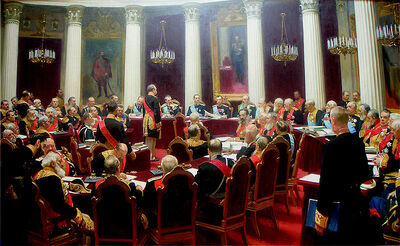Youngla0450 (talk | contribs) |
No edit summary |
||
| (2 intermediate revisions by the same user not shown) | |||
| Line 1: | Line 1: | ||
[[File:State_Council_of_Russia.jpg|thumb|400px|The State Council meeting about democratic industrial reforms, 1905. ]] |
[[File:State_Council_of_Russia.jpg|thumb|400px|The State Council meeting about democratic industrial reforms, 1905. ]] |
||
| − | The '''State Council of Russia''' is the upper house of the [[Imperial Parilament]] and the supreme |
+ | The '''State Council of Russia''' is the upper house of the [[Imperial Parilament]] and the supreme imperial advisory body to the [[Emperor of Russia]]. |
| + | ==Compositions, Appointments, and Elections== |
||
| − | ==Composition, Appointment, Election== |
||
| − | Unlike the British House of Lords, the State Council has two diffrent ways of becoming a member |
+ | Unlike the British House of Lords, the State Council has two diffrent ways of becoming a member. Election by society or appointment by the Emperor. About half the council is appointed by the Emperor on the basis of military, civil, and public services. The other half of the council is elected through a British-styled electorate by the people in different districts. These includes: |
*56 seats from Zemstvo (1 from each gubyrnya) |
*56 seats from Zemstvo (1 from each gubyrnya) |
||
| Line 19: | Line 19: | ||
*2 seats from the [[Senate of Finland]] |
*2 seats from the [[Senate of Finland]] |
||
| − | + | In totals, there are 101 members of the Council. |
|
==Powers and Functions== |
==Powers and Functions== |
||
| − | The |
+ | The council acts as the supreme imperial advisory body to the Emperor of Russia. The council, as the upper house, approves actions of the lower house and can reject lower-house bills but it can be overrided by the Emperor with a 2/3 vote by the lower house if the Monarchy allows it. The council carries out the Emperor's legislative programs and can create their own with his imperial seal of approval and with the consent of the lower house. The council investigates, proglumates, and aborgates laws. |
==Commitees== |
==Commitees== |
||
Latest revision as of 15:24, 17 December 2011

The State Council meeting about democratic industrial reforms, 1905.
The State Council of Russia is the upper house of the Imperial Parilament and the supreme imperial advisory body to the Emperor of Russia.
Compositions, Appointments, and Elections[]
Unlike the British House of Lords, the State Council has two diffrent ways of becoming a member. Election by society or appointment by the Emperor. About half the council is appointed by the Emperor on the basis of military, civil, and public services. The other half of the council is elected through a British-styled electorate by the people in different districts. These includes:
- 56 seats from Zemstvo (1 from each gubyrnya)
- 18 seats from Assemblies of Noblity
- 6 seats from the Russian Orthodox Church, 3 from white clergy, 3 from monks
- 12 seats from stock exchange communites, chambers of commerce and business associations
- 6 seats from the Imperial Academy of Sciences
- 2 seats from the Senate of Finland
In totals, there are 101 members of the Council.
Powers and Functions[]
The council acts as the supreme imperial advisory body to the Emperor of Russia. The council, as the upper house, approves actions of the lower house and can reject lower-house bills but it can be overrided by the Emperor with a 2/3 vote by the lower house if the Monarchy allows it. The council carries out the Emperor's legislative programs and can create their own with his imperial seal of approval and with the consent of the lower house. The council investigates, proglumates, and aborgates laws.
Commitees[]
The Council is divided into the following commitees:
- Committee on Constitutional Legislation
- Committee on Judicial and Legal Affairs
- Committee on Defence and Security
- Budgetary Committee
- Committee on Financial Markets and Currency Circulation
- Foreign Affairs Committee
- Committee on the Commonwealth of Monarchies
- Committee on Federal Affairs and Regional Policies
- Committee on Local Government
- Social Policy Committee
- Committee on Economic Policy, Business and Ownership
- Industrial Policy Committee
- Committee on Natural Resources and Environmental Protection
- Committee on Food and Agricultural Policies
- Committee for Science, Culture, Education, Public Health and Ecology
- Committee on Northern Territories and Indigenous Minorities
- Commission on Standing Orders and Parliamentary Performance Organisation
- Commission for the Council of Federation's Performance Maintenance Monitoring
- Commission on Ways and Means of the Council of Federation's Constitutional Powers Implementation
- Commission for Interaction with the Accounts Chamber of the Russian Federation
- Commission on Youth and Sports
- Commission on Information Policy
- Commission on Natural Monopolies